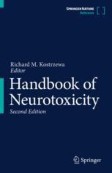Search
Search Results
-
The Foundational Science of Endogenous Opioids and Their Receptors
The function of endogenous opioids spans from initiating behaviors that are critical for survival, to responding to rapidly changing environmental...
-
A Novel Peptide Driving Neurodegeneration Appears Exclusively Linked to the α7 Nicotinic Acetylcholine Receptor
T14, a 14mer peptide, is significantly increased in the pre-symptomatic Alzheimer’s disease brain, and growing evidence implies its pivotal role in...

-
Evaluation of Acetylcholine Synthesis and Release in Striatal Cholinergic Interneurons
Acetylcholine (ACh), an essential neurotransmitter in the central nervous system (CNS), plays important roles in brain functions, such as memory and...
-
Utilization of Superfused Cerebral Slices in Probing Muscarinic Receptor Autoregulation of Acetylcholine Release
Signal transmission from cholinergic nerves is mediated by two classes of receptors: (1) ionotropic nicotinic receptor channels and (2) metabotropic...
-
Role of α7 Nicotinic Acetylcholine Receptors in Synaptic Transmission in Frog Neuromuscular Contacts
The role of α7 nicotinic acetylcholine receptors in coupling of synaptic activity and muscle contractions was studied in frog ( Rana ridibunda )...
-
Tissue-Segment Binding Method for Detection of Muscarinic Acetylcholine Receptors in Receptor’s Natural Environment
The pharmacological and biochemical properties of G protein-coupled receptors have been recently revealed to be more complex than originally...
-
Acetylcholine Analog-Modified Albumin Nanoparticles for the Enhanced and Synchronous Brain Delivery of Saponin Components of Panax Notoginseng
BackgroundPanax notoginseng saponins (PNS) are commonly used first-line drugs for treating cerebral thrombosis and stroke in China. However, the...

-
α7 nicotinic acetylcholine receptor agonist improved brain injury and impaired glucose metabolism in a rat model of ischemic stroke
Vagus nerve stimulation through the action of acetylcholine can modulate inflammatory responses and metabolism. α7 Nicotinic Acetylcholine Receptor...

-
Endogenous Neural Stem Cell–induced Neurogenesis after Ischemic Stroke: Processes for Brain Repair and Perspectives
Ischemic stroke is a very common cerebrovascular accident that occurred in adults and causes higher risk of neural deficits. After ischemic stroke,...

-
The M1 muscarinic acetylcholine receptor regulates the surface expression of the AMPA receptor subunit GluA2 via PICK1
Muscarinic acetylcholine receptors (mAChRs) have been shown to play significant roles in the regulation of normal cognitive processes in the...

-
Cholinergic signaling via the α7 nicotinic acetylcholine receptor regulates the migration of monocyte-derived macrophages during acute inflammation
BackgroundThe involvement of the autonomic nervous system in the regulation of inflammation is an emerging concept with significant potential for...

-
Mis-localization of endogenous TDP-43 leads to ALS-like early-stage metabolic dysfunction and progressive motor deficits
BackgroundThe key pathological signature of ALS/ FTLD is the mis-localization of endogenous TDP-43 from the nucleus to the cytoplasm. However, TDP-43...

-
Intestinal Flora Affect Alzheimer's Disease by Regulating Endogenous Hormones
Alzheimer's disease (AD) is a central nervous system disease that can lead to cognitive impairment and progressive memory loss. An increasing number...

-
Endogenous Kynurenic Acid and Neurotoxicity
Tryptophan metabolism along with kynurenine pathway yields a number of neuroactive compounds. Among kynurenine derivatives, neuroprotective kynurenic...
-
MultiBacMam Technology for Studying the Downstream cAMP Signaling Pathway of M2 Muscarinic Acetylcholine Receptor
Measuring the inhibition of adenylate cyclase upon Gαi-coupled receptor activation has been challenging as it usually requires prior activation of...
-
α7 Nicotinic acetylcholine receptor: a key receptor in the cholinergic anti-inflammatory pathway exerting an antidepressant effect
Depression is a common mental illness, which is related to monoamine neurotransmitters and the dysfunction of the cholinergic, immune, glutamatergic,...

-
Muscarinic Acetylcholine Receptors-Mediated Activation of PKC Restores the Hippocampal Immediate Early Gene Expression and CREB Phosphorylation in Scopolamine-Induced Amnesic Mice
Amnesia is the inability to store new information and recall old memories. After the postulation of cholinergic hypothesis of geriatric memory...

-
Endogenous Acetylcholine and Its Modulation of Cortical Microcircuits to Enhance Cognition
Acetylcholine regulates the cerebral cortex to sharpen sensory perception and enhance attentional focus. The cellular and circuit mechanisms of this...
-
Different peripheral expression patterns of the nicotinic acetylcholine receptor in dementia with Lewy bodies and Alzheimer’s disease
BackgroundThe diffuse distribution of nicotinic cholinergic receptors (nAChRs) in both brain and peripheral immune cells points out their involvement...

-
Association of autoantibodies to muscarinic acetylcholine receptors with gastrointestinal symptoms and disease severity in patients with postural orthostatic tachycardia syndrome
Previous studies have reported a relationship between postural orthostatic tachycardia syndrome (POTS) and positivity for serum autoantibodies...

